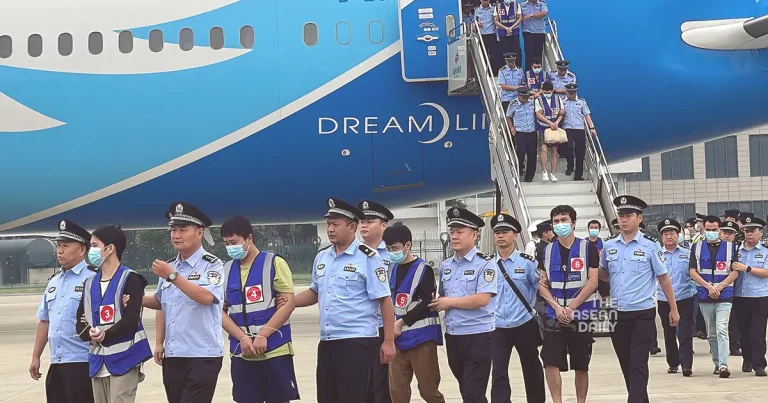21-12-2023 (YANGON) A video has emerged on Myanmar social media platforms, depicting a man identifying himself as Bi Huijun, issuing a grave warning to his family from what appears to be a padded cell. In the video, Bi claims that they “earn money from telescams” and warns that the Chinese government will exact revenge, even calling for the immediate release of victims from across the border. While the authenticity of the video could not be independently verified by Bloomberg, it serves as an example of the Chinese Communist Party’s crackdown on criminal organizations that have been involved in scams, kidnappings, and torturing Chinese citizens.
Recent months have seen thousands of suspects deported from Myanmar to China, shedding light on the magnitude of the issue. The United Nations estimates that around 120,000 people in Myanmar alone have fallen victim to such criminal activities. Just this week, Chinese authorities announced the repatriation of a suspected gang leader from Myanmar, as stated in a police statement. Furthermore, China has placed bounties of 500,000 yuan ($70,000) on the heads of ten crime bosses.
Previously, it was unlikely for such a campaign to occur, as Myanmar’s military had ignored Beijing’s calls to address the multi-billion-dollar scam industry. However, when rebel groups with ties to China initiated an operation to oust the junta from the border region in October, China swiftly responded.
China’s growing concern about scams operating abroad reflects its fragile economic situation at home. As the world’s second-largest economy experiences a slowdown and property prices plummet, one in five young people find themselves unemployed, making them vulnerable to fraudsters promising a better life overseas.
Maria Repnikova, an assistant professor in global communication at Georgia State University and an expert on China’s political communication, states that the crackdown is a symbolic mechanism to show the public that the authorities are listening and responding to their grievances.
Maj Gen Zaw Min Tun, the spokesperson for Myanmar’s ruling State Administration Council, mentioned in a televised broadcast that the military junta faced difficulties in tackling cyber gangs due to their presence in areas controlled by rebel groups. He warned that any military intervention would result in battles and the destruction of peace.
President Xi Jinping’s state visit to Myanmar in 2020 marked a critical turning point in the economic ties between the two countries. China aimed to develop key projects integrating Myanmar into its flagship Belt and Road Initiative. However, with Myanmar now embroiled in a civil war, the China-Myanmar Economic Corridor projects have stalled, allowing cyber crime syndicates to flourish. These syndicates, often led by Chinese fugitives who fled China following a domestic crackdown in 2020, sought refuge in regions of Myanmar known for weak governance.
The extent of the problem in China is unclear, but the lure, kidnapping, and trafficking of its citizens have become so severe that it inspired a popular film, “No More Bets,” which grossed 3.5 billion yuan ($490 million) at the box office this summer. The movie portrays a computer programmer enticed overseas with the promise of high-paying work, only to be coerced into running internet scams under the threat of torture. The film struck a chord with audiences but drew criticism from authorities in Cambodia and Myanmar. It has also led some Chinese tourists to reconsider their plans to visit Thailand.
In August, the story of a indebted graduate who was trafficked across the border after being promised a lucrative translation job in Singapore dominated Chinese social media. He was forced to work 18 hours a day, convincing people to invest in digital currency.
To address people’s concerns about cyber scams, the Chinese police are conducting special operations overseas, as stated in a recent commentary by the state-run People’s Daily. These efforts aim to reassure the Chinese population.
The borderlands of Myanmar’s northern Shan state have long been a refuge for warlords engaged in various illicit activities, including illegal wildlife trade, gambling, and narcotics production. China’s interests in the region have mainly revolved around preventing violence from spilling over. Despite international pressure, Beijing has refrained from denouncing the junta and maintained close ties with rebel groups controlling territories along the border.
Now, China’s balancing act seems to be paying off. When the Three Brotherhood Alliance, consisting of Myanmar ethnic groups, launched an offensive in October, one of their stated goals was to eradicate cyber crime rings, seemingly an attempt to win favor with China. Myanmar has already extradited 31,000 suspects involved in scams to China as of November, according to a Chinese government statement.
Richard Horsey, senior Myanmar adviser with the International Crisis Group, suggests that China will allow the rebel groups to take control of the region and then pressure both sides to accept the status quo. Myanmar’s ruling junta has announced that China is assisting in brokering discussions with a rebel alliance.
For President Xi, demonstrating that his government is cracking down on scams that impoverish ordinary people is crucial. The Chinese Communist Party has long maintained reduced political freedoms in exchange for greater prosperity. Yun Sun, director of the China program at the Stimson Center, emphasizes the tremendous pressure on China as these operations extend beyond cyber scams. The pressure primarily stems from domestic concerns.




